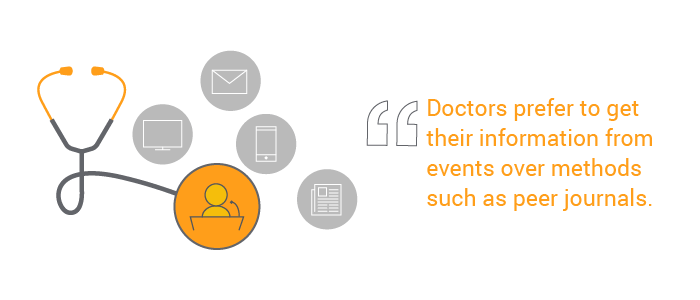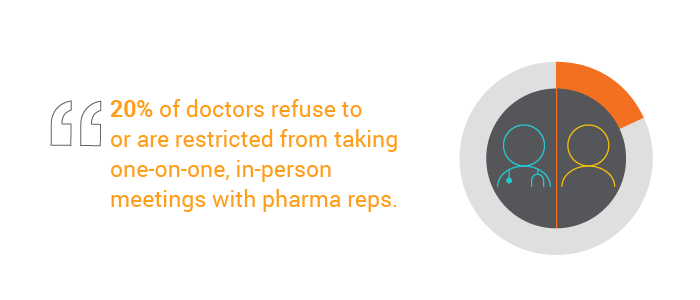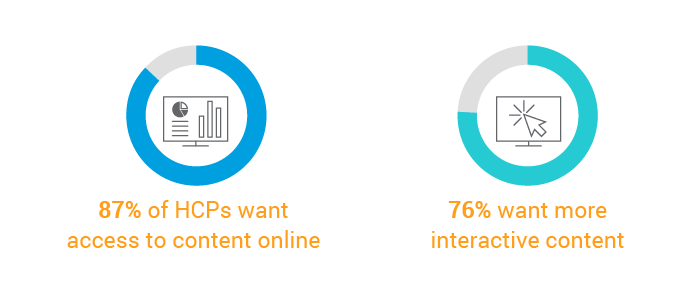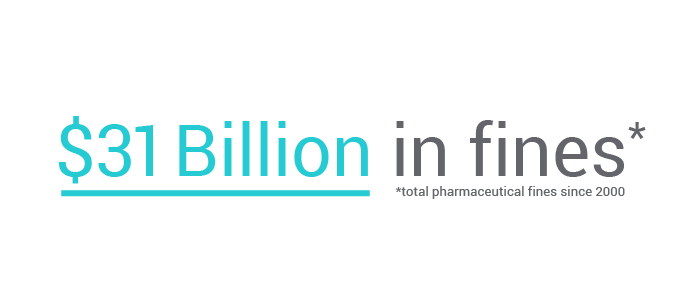Blog
Q&A: Trends and Considerations for Life Sciences Event Strategies
Jan 31, 2019 | Nick Baxter
Jan 31, 2019 | Nick Baxter
Nearly 95% of doctors believe that pharmaceutical-sponsored educational events provide useful information1. Nick Baxter, commercial strategy at Veeva, discusses what’s causing this trend and how life sciences companies can ensure their events are providing value to customers.
What trends are you seeing in the life science events space today, and what are the impacts?
Therapies are becoming more specialized, and stricter transparency regulations require doctors to know more about what they prescribe. Doctors need access to the best information and seek this knowledge from the most trusted leaders in their field. And doctors prefer to get their information from events over methods such as peer journals2.
In some cases, doctors rely exclusively on events for medical information, making it hard for pharmaceutical companies to reach customers. Declining access to these low and no-see healthcare professionals (HCPs) means events may be the only touch point reps have with customers.
The events space is also becoming more virtual. Many of today’s doctors are digital natives and expect technology to play a large part in their event experience, from email invites to online content. HCPs often prefer a digital format for event logistics and post-meeting content, and 40% even feel online meetings provide the same level of knowledge and information sharing as face-to-face events3.
Some companies are running entire events virtually, which eliminates travel and venue costs and gives doctors the ability to attend from the comfort of their office or home.
Given that access to low and no see HCPs is declining, how can life sciences companies leverage events to stay ahead of this trend and ensure they’re engaging with key customers?
Life sciences companies should think of events as another channel to reach doctors, much like how they view emails and face-to-face meetings. Events should not exist in their own silo but rather as part of a company’s overall customer engagement strategy. With almost 20% of doctors refusing to or restricted from taking one-on-one, in-person meetings with reps, events offer the opportunity for valuable face time4.
Integrating events into the overall customer engagement strategy requires a central foundation for CRM and events management solutions so teams can track all HCP activity (email, in-person meetings, events) in a single system.
With customer data in one location, reps can better understand how and when a doctor wants to be reached to ultimately deliver a more meaningful experience. This single solution also benefits life sciences companies – teams across the globe have visibility into the same information, allowing for more coordinated customer outreach.
How can life sciences companies ensure their events provide value to HCPs?
When it comes to measuring the success of events, companies should continue to think digitally. 87% of HCPs want to access event content online, and 76% want more interactive content, such as mobile app polling, during sessions5 . Digital content is not only more engaging but also convenient, accessible, and easier to share with colleagues.
Many HCPs also think events need higher quality information6. Pharma companies may know this, but often struggle to measure and define what “quality content” looks like. Understanding which messages resonate with customers is key. A single system for events management and CRM helps teams identify which materials HCPs engage with during one-on-one meetings or through email. Reps can then use this data to drive event strategy, topic selection, and content development.
Creating more targeted events and content makes it easier to align attendees to topics and speakers. Customers will view these companies as reliable sources of medical information and prioritize attending their events.
In some cases, events aren’t the best way to reach HCPs. Reps might deduce that a customer will prefer a simple email or call. These insights are only possible when a company’s customer and events data exist in one system.
What other challenges do life sciences companies face when executing events?
Maintaining event compliance is a central concern. Companies that fail to meet industry regulations can face steep fines or be forced to enter a corporate integrity agreement. These agreements require companies to overhaul standard operating procedures and maintain detailed event reports, costing additional time, resources, and money.
One of the biggest risk areas for non-compliance is transfer of value reporting. A component of the Sunshine Act, transfer-of-value reporting requires companies to detail every interaction and dollar spent on a customer—including small expenses like meals or coffee—in event close out. To further complicate the issue, many states, counties, and cities have imposed their own spending caps, forcing teams to keep track of region-specific rules on top of already complex budgets.
Given these harsh penalties and strict rules, the life sciences industry has been hesitant to embrace new technologies for managing events. Teams have become used to decades-old procedures, fearing that if they update their processes, they’ll make a costly mistake.
However, the exact opposite is true. Today’s technology provides important safeguards to protect companies against violations. Life sciences-specific cloud applications evolve to comply with the latest requirements so teams can follow local laws. Access to a unified global system also allows the home office to quickly approve event budgets and review close out reports for even the smallest regional meetings. For one large pharma, centralizing events management helped them cut approval processes from two months to two weeks. And, because an integrated events management and CRM solution means all customer touch points are stored in one location, reps will have confidence that their transfer-of-value reporting is accurate.
What advice can you give to companies looking to overhaul their events strategy?
Life sciences companies need to start thinking beyond the traditional events model.
The most successful strategies mix in-person, virtual, and hybrid events (live events with an online component) – in fact, 78% of HCPs want companies to offer both physical and online events7. Reps and doctors value the face-to-face interactions made possible through in-person meetings, but find virtual events more convenient and cost effective. Offering multiple event formats allows HCPs to select those that best fit their schedule and preferences. For life sciences companies, this means higher registration numbers and customer satisfaction.
Companies should also take advantage of the latest technologies, like Artificial Intelligence (AI). Some pharmaceutical and biotech companies are using AI in drug discovery and development, but it has implications in the commercial space as well. AI and predictive analytics are already helping reps make faster decisions on how to reach customers through their preferred channels, including events. This technology can also provide new insights about content performance to help teams make content more engaging and relevant.
Interested in learning how other top pharmas are improving events management? Check out how one company unified global events management for more productive teams and higher-impact medical events.
1http://phrma-docs.phrma.org/sites/default/files/pdf/krcsurveyofphysicians_1.pdf
2 http://start.ashfieldmeetings.com/acton/attachment/36531/f-0017/1/-/-/-/-/GB_Final_Science%20of%20Healthcare%20Professional%20Meetings%20white%20paper.pdf?sid=TV2:nu4VesPdI
3 http://start.ashfieldmeetings.com/acton/attachment/36531/f-0017/1/-/-/-/-/GB_Final_Science%20of%20Healthcare%20Professional%20Meetings%20white%20paper.pdf?sid=TV2:nu4VesPdI
4 https://www.mmm-online.com/home/channel/data-analytics/is-pharmas-access-to-physicians-decreasing-or-increasing/
5 http://start.ashfieldmeetings.com/acton/attachment/36531/f-0017/1/-/-/-/-/GB_Final_Science%20of%20Healthcare%20Professional%20Meetings%20white%20paper.pdf?sid=TV2:nu4VesPdI
6 http://start.ashfieldmeetings.com/acton/attachment/36531/f-0017/1/-/-/-/-/GB_Final_Science%20of%20Healthcare%20Professional%20Meetings%20white%20paper.pdf?sid=TV2:nu4VesPdI
7 http://start.ashfieldmeetings.com/acton/attachment/36531/f-0017/1/-/-/-/-/GB_Final_Science%20of%20Healthcare%20Professional%20Meetings%20white%20paper.pdf?sid=TV2:nu4VesPdI





